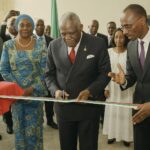Setting the Stage for a New Bilateral Tempo
When Ambassador Enrico Nunziata stepped into the marble halls of the Ministry of Posts, Telecommunications and the Digital Economy last month, the encounter was more than a courtesy call; it signalled the modulation of a strategic duet between Rome and Brazzaville. By reaffirming Italy’s readiness to accompany Congo’s Digital Strategy 2025, the envoy echoed the forward-looking posture adopted by President Denis Sassou Nguesso, whose administration views technological modernisation as both an economic multiplier and a diplomatic asset. Congolese officials, buoyed by recent macroeconomic stabilisation figures from the IMF, argue that a coherent digital ecosystem can widen fiscal space, enhance public-service delivery and project soft power across Central Africa.
- Setting the Stage for a New Bilateral Tempo
- Strategic Convergence amid Shifting Geopolitics
- Plan Mattei: An African Overture, Congolese Movement
- Digital Governance: Roles of UNDP and Domestic Institutions
- Youth and Start-Up Ecosystem: Promise and Pragmatism
- Energy-Digital Nexus: Toward Integrated Resilience
- Calibrating Expectations for a Sustainable Partnership
- From Memorandum to Momentum
Strategic Convergence amid Shifting Geopolitics
Italy’s overture dovetails with a broader European redirection toward pragmatic partnerships on the continent. The Mattei Plan, announced at the 2023 Italy-Africa summit, positions Rome as a facilitator of opportunity rather than a prescriptive donor, prioritising co-ownership and private-sector traction (Italian MFA 2023). For Brazzaville, historically attentive to diversified alliances, this approach offers flexibility. The Republic of Congo already hosts French, Chinese and Emirati operators in hydrocarbons and infrastructure; the Italian dimension adds a technological layer that avoids zero-sum perceptions in an increasingly multipolar environment.
Plan Mattei: An African Overture, Congolese Movement
The Plan’s ambition to nurture 500,000 African start-ups over the coming decade resonates with Congo’s demographic profile—over 60 percent of the population is under 25. Italian development agency data indicate an initial €65 million envelope for Central Africa, with Congo ranked as a priority beneficiary given its track record in water-management, agriculture and health cooperation (AICS 2024). The memorandum of understanding signed in Rome on 20 June establishes a joint steering committee that will meet bi-annually to calibrate progress indicators, ranging from digital-service penetration rates to AI-driven public-health diagnostics.
Digital Governance: Roles of UNDP and Domestic Institutions
UNDP Resident Representative Adama Dian Barry frames her organisation’s involvement as that of an ‘honest broker and technical catalyst’ (UNDP 2024). Concretely, the agency will embed advisers within the National Agency for State Information Systems to help draft interoperable standards and to pilot a regulatory sandbox for fintech experimentation. The Ministry of Digital Economy, meanwhile, has begun legislative consultations on personal-data protection, mindful of regional precedents in Rwanda and Senegal. Such governance scaffolding is pivotal to crowding-in private investment—an imperative underscored in recent African Development Bank assessments that link regulatory predictability to a 30 percent uptick in venture-capital inflows.
Youth and Start-Up Ecosystem: Promise and Pragmatism
Congo’s nascent innovation hubs—Wetech in Pointe-Noire and Burotech in Brazzaville—are slated to interface with Italy’s Luiss EnLabs accelerator, allowing Congolese founders to tap mentorship circuits in Milan and Turin. Yet policymakers concede that skills deficits persist: only one in five secondary-school graduates show proficiency in STEM disciplines, according to the World Bank’s 2023 Human Capital Report. To bridge the gap, a scholarship corridor will dispatch fifty Congolese engineering students annually to Italian polytechnics, while incoming Italian experts will run short-cycle coding bootcamps on Congolese soil. Such two-way mobility is expected to seed collaborative patents and foster business bilingualism in French and Italian markets.
Energy-Digital Nexus: Toward Integrated Resilience
Observers often overlook the symbiosis between energy security and digital transformation. Italy’s energy major ENI—already a cornerstone of Congo’s offshore gas sector—plans to leverage its renewable portfolio to power data centres with solar micro-grids, mitigating the carbon footprint that accompanies cloud expansion (ENI 2024). The Ministry of Hydrocarbons is exploring blockchain-enabled monitoring of flare-gas reduction targets, illustrating how digital tools can reinforce environmental stewardship without compromising production quotas. Such integration dovetails with the government’s commitment under the Paris Agreement and aligns with G7 statements advocating tech-driven sustainability.
Calibrating Expectations for a Sustainable Partnership
Diplomats in Brazzaville caution that pilot projects must mature into scalable models. Previous donor-led ICT ventures faltered when grant cycles expired, highlighting the need for revenue-generating pathways and local ownership. The current arrangement attempts to mitigate that risk by pairing concessional financing with equity funds sourced from Italian impact investors. Monitoring mechanisms will be co-chaired, ensuring transparency without infringing on Congo’s sovereign prerogatives—a nuance that satisfies domestic constituencies vigilant about external conditionalities. Ultimately, the partnership’s credibility will rest on tangible metrics: broadband affordability, start-up survival rates and job creation for an urban youth cohort hungry for opportunity.
From Memorandum to Momentum
As the ink dries on the memorandum, Rome and Brazzaville appear attuned to the tempo required for a credible digital crescendo. The matinee performance has attracted regional spectators: Gabonese and Cameroonian officials have discreetly requested briefings, an early sign of Congo’s budding convening power. Should the initiative deliver, it may well transform Brazzaville from a passer-by on the information superhighway into a conductor of its own digital symphony—an evolution consistent with President Sassou Nguesso’s vision of a resilient, diversified and technologically agile republic.





















